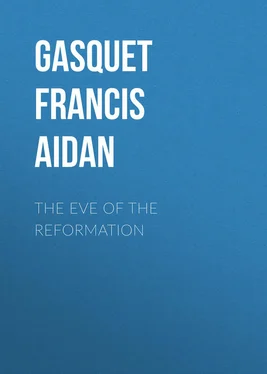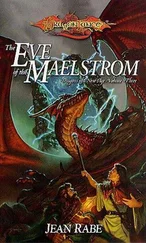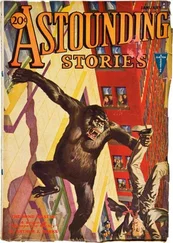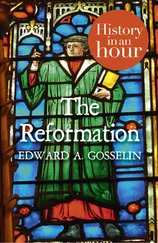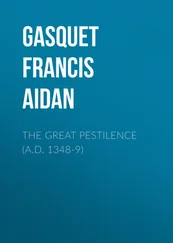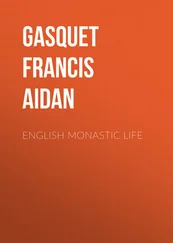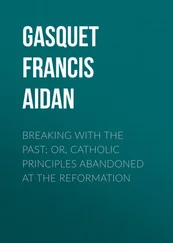Francis Gasquet - The Eve of the Reformation
Здесь есть возможность читать онлайн «Francis Gasquet - The Eve of the Reformation» — ознакомительный отрывок электронной книги совершенно бесплатно, а после прочтения отрывка купить полную версию. В некоторых случаях можно слушать аудио, скачать через торрент в формате fb2 и присутствует краткое содержание. Жанр: foreign_antique, foreign_prose, на английском языке. Описание произведения, (предисловие) а так же отзывы посетителей доступны на портале библиотеки ЛибКат.
- Название:The Eve of the Reformation
- Автор:
- Жанр:
- Год:неизвестен
- ISBN:нет данных
- Рейтинг книги:3 / 5. Голосов: 1
-
Избранное:Добавить в избранное
- Отзывы:
-
Ваша оценка:
- 60
- 1
- 2
- 3
- 4
- 5
The Eve of the Reformation: краткое содержание, описание и аннотация
Предлагаем к чтению аннотацию, описание, краткое содержание или предисловие (зависит от того, что написал сам автор книги «The Eve of the Reformation»). Если вы не нашли необходимую информацию о книге — напишите в комментариях, мы постараемся отыскать её.
The Eve of the Reformation — читать онлайн ознакомительный отрывок
Ниже представлен текст книги, разбитый по страницам. Система сохранения места последней прочитанной страницы, позволяет с удобством читать онлайн бесплатно книгу «The Eve of the Reformation», без необходимости каждый раз заново искать на чём Вы остановились. Поставьте закладку, и сможете в любой момент перейти на страницу, на которой закончили чтение.
Интервал:
Закладка:
Evidence of what, above, has been called the probable searching of men’s minds as to the action of the Popes in temporal matters, may be seen in a book called a Dyalogue between a knight and a clerk, concerning the power spiritual and temporal . 110 110 London, Thomas Berthelet.
In reply to the complaint of the clerk that in the evil days in which their lot had fallen “the statutes and ordinances of bishops of Rome and the decrees of holy fathers” were disregarded, the knight exposes a layman’s view of the matter. “Whether they ordain,” he says, “or have ordained in times past of the temporality, may well be law to you, but not to us. No man has power to ordain statutes of things over which he has no lordship, as the king of France may ordain no statute (binding) on the emperor nor the emperor on the king of England. And just as princes of this world may ordain no statutes for your spirituality over which they have no power; no more may you ordain statutes of their temporalities over which you have neither power nor authority. Therefore, whatever you ordain about temporal things, over which you have received no power from God, is vain (and void). And therefore but lately, I laughed well fast, when I heard that Boniface VIII. had made a new statute that he himself should be above all secular lords, princes, kings, and emperors, and above all kingdoms, and make laws about all things: and that he only needed to write, for all things shall be his when he has so written: and thus all things will be yours. If he wishes to have my castle, my town, my field, my money, or any other such thing he needed, nothing but to will it, and write it, and make a decree, and wot that it be done, (for) to all such things he has a right.”
The clerk does not, however, at once give up the position. You mean, he says in substance, that in your opinion the Pope has no power over your property and goods. “Though we should prove this by our law and by written decrees, you account them for nought. For you hold that Peter had no lordship or power over temporals, but by such law written. But if you will be a true Christian man and of right belief, you will not deny that Christ is the lord of all things. To Him it is said in the Psalter book: ‘Ask of me, and I will give you nations for thine heritage, and all the world about for thy possession’ (Ps. ii.). These are God’s words, and no one doubts that He can ordain for the whole earth.”
Nobody denies God’s lordship over the earth, replied the knight, “but if be proved by Holy Writ that the Pope is lord of all temporalities, then kings and princes must needs be subject to the Pope in temporals as in spirituals.” So they are, in effect, answered the clerk. Peter was made “Christ’s full Vicar,” and as such he can do what his lord can, “especially when he is Vicar with full power, without any withdrawing of power, and he thus can direct all Christian nations in temporal matters.” But, said the knight, “Christ’s life plainly shows that He made no claim whatever to temporal power. Also in Peter’s commission He gave him not the keys of the kingdom of the earth, but the keys of the kingdom of heaven. It is also evident that the bishops of the Hebrews were subjects of the kings, and kings deposed bishops; but,” he adds, fearing to go too far, “God forbid that they should do so now.” Then he goes on to quote St. Paul in the Epistle to the Hebrews to prove that St. Peter was Christ’s Vicar only in “the godly kingdom of souls, and that though some temporal things may be managed by bishops, yet nevertheless it is plain and evident that bishops should not be occupied in the government of the might and lordship of the world.” And indeed, he urges, “Christ neither made St. Peter a knight nor a crowned king, but ordained him a priest and bishop.” If the contention that “the Pope is the Vicar of God in temporal matter be correct,” then of necessity you must also grant that “the Pope may take from you and from us all the goods that you and we have, and give them all to whichever of his nephews or cousins he wills and give no reason why: and also that he may take away from princes and kings principalities and kingdoms, at his own will, and give them where he likes.” 111 111 A dyalogue , ut sup. , ff. 3-7.
This statement by the layman of the advanced clerical view is somewhat bald, and is probably intentionally exaggerated; but that it could be published even as a caricature of the position taken up by some ecclesiastics, shows that at this time some went very far indeed in their claims. It is all the more remarkable that the argument is seriously put forward in a tract, the author of which is evidently a Catholic at heart, and one who fully admits the supreme jurisdiction of the Pope in all matters spiritual. Of course, when the rejection of Papal jurisdiction became imminent, there were found many who by sermons and books endeavoured to eradicate the old teaching from the people’s hearts, and then it was that what was called, “the pretensions” of the successors of St. Peter in matters temporal were held up to serve as a convenient means of striking at the spiritual prerogatives. As a sample, a small book named a Mustre of scismatyke bysshops of Rome may be taken. It was printed in 1534, and its title is sufficient to indicate its tone. The author, one John Roberts, rakes together a good many unsavoury tales about the lives of individual Popes, and in particular he translates the life of Gregory VII. to enforce his moral. In his preface he says, “There is a fond, foolish, fantasy raging in many men’s heads nowadays, and it is this: the Popes, say they, cannot err. This fantastical blindness was never taught by any man of literature, but by some peckish pedler or clouting collier: it is so gross in itself.” And I “warn, advise, beseech, and adjure all my well-beloved countrymen in England that men do not permit themselves to be blinded with affection, with hypocrisy, or with superstition. What have we got from Rome but pulling, polling, picking, robbing, stealing, oppression, blood-shedding, and tyranny daily exercised upon us by him and his.” 112 112 f. A. ii.; c. i.; c. iiij. The author recommends those who would understand the Pope’s power to “resort unto The glasse of truth or to the book named the Determinations of the universities .” The book named here A glasse of truth is written in favour of the divorce. “Some lawyers,” the author says, “attribute too much to the Pope – at length there shall be no law, but only his will.” The work was published by Berthelet anonymously, but Richard Croke, in a letter written at this period (Ellis, Historical Letters , 3rd series, ii. 195), says that the book was written by King Henry himself. It was generally said that Henry had written a defence of his divorce; but Strype did not think it was more than a State paper. Croke (p. 198) says that people at Oxford, “Mr. John Roper and others,” did not believe that the king was really the author. He says that the tract has done more than anything else to get people to take the king’s side.
Again, as another example of how the mind of the people was stirred up, we may take a few sentences from A Worke entytled of the olde God and the new . This tract is one of the most scurrilous of the German productions of the period. It was published in English by Myles Coverdale, and is on the list of books prohibited by the king in 1534. After a tirade against the Pope, whom he delights in calling “anti-Christ,” the author declares that the Popes are the cause of many of the evils from which people were suffering at that time. In old days, he says, the Bishop of Rome was nothing more “than a pastor or herdsman,” and adds: “Now he who has been at Rome in the time of Pope Alexander VI. or of Pope Julius II., he need not read many histories. I put it to his judgment whether any of the Pagans or of the Turks ever did lead such a life as did these.” 113 113 Of the olde God and the new , B. 1. As another sample of what was at this time said about the Popes, we may take the following: Rome, says the author, “was by Justinian restored from ruin and decay, from whence also came the riches of the Church. At the coming of these riches, forthwith the book of the gospel was shut up, and the Bishops of Rome, instead of evangelical poverty, began to put forth their heads garnished with three crowns.” This is taken from the preface of Hartman Dulechin, who claims to have “taught the book to speak Latin.” It was originally printed and published in German. The English version is a translation of the Latin.
Интервал:
Закладка:
Похожие книги на «The Eve of the Reformation»
Представляем Вашему вниманию похожие книги на «The Eve of the Reformation» списком для выбора. Мы отобрали схожую по названию и смыслу литературу в надежде предоставить читателям больше вариантов отыскать новые, интересные, ещё непрочитанные произведения.
Обсуждение, отзывы о книге «The Eve of the Reformation» и просто собственные мнения читателей. Оставьте ваши комментарии, напишите, что Вы думаете о произведении, его смысле или главных героях. Укажите что конкретно понравилось, а что нет, и почему Вы так считаете.
